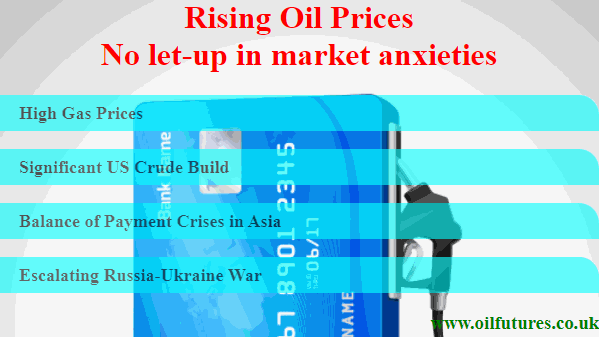It is now clear that the release of SPRs, strategic petroleum reserves, is not a magic wand in reversing the steep rise in crude oil prices; the movers and shakers of the markets simply know that the release is just a drop in the ocean, just to earn a psychological victory for political reasons before the beleaguered masses.
In short, without a substantial increase in supply, the strategy is just a square plug in the round hall. If analysts see this as the only strategy that the Western leaders can think of at present, the very move will lose its shine and relevance in due course, when policy makers scrambled to bang on heads, metaphorically speaking, are confined to places where there is very little room to manoeuvre.
On Monday, the price of crude oil fell sharply, when the IEA, International Energy Agency, grabbed headlines with its share of release of crude oil. When the numbers sank in, however, price of crude oil started going up again; the quantity released was nowhere near enough to a figure to reverse the price rising of crude oil.
Consumers were dealt yet another blow during the past few weeks as the price of LNG, liquefied natural gas, kept climbing too quite steeply as the European Union started the uphill battle of turning their back on Russian oil and gas, despite the existing contracts and the inability to find alternatives.
Fortunately, Europe is slowly approaching summer months and in this context, the issue of heating homes will be of no concern for a few more months.
On the other hand, analysts are worried as to why the prices of gas went up by such a margin when the demand is in decline in proportion to the rising temperatures.
The demand for crude oil in the next few months, meanwhile, is going to be affected by a new regional development - BoP, balance of payment, crises faced by some developing nations in Asia, exacerbated by the combination of rising imports, falling remittances and depleting foreign reserves and of course, growing dissension among people in the countries affected.
Sri Lanka, for instance, is going through its worst economic crisis since independence from Britain in 1948. Nepal, Pakistan and even Malaysia are facing economic headwinds, although it is not on a scale that the former is facing - for now.
The cumulative impact on the demand of crude oil in these circumstances is going to be significant in the coming months. In addition, the rising Covid-19 infections in certain regions of China, the world's largest consumer of crude oil and the latter's determination to maintain a zero-Covid strategy is going to bring the demand down too.
Last, but not least, the war in Ukraine, especially in the aftermath of the sinking of Russian warship in the Black Sea, has the potential to create a serious military development between the NATO and Russia unless sanity breaks out in the region on fire; some Russian politicians say the Third World War has already started, when Russia, the nation with the largest stockpiles of nuclear weapons, keep raising the nuclear spectacle for the West to see in the full glare of publicity.








